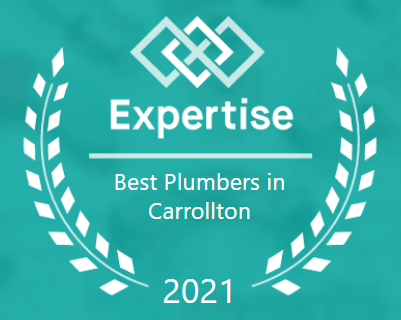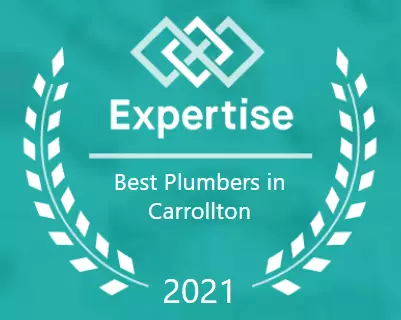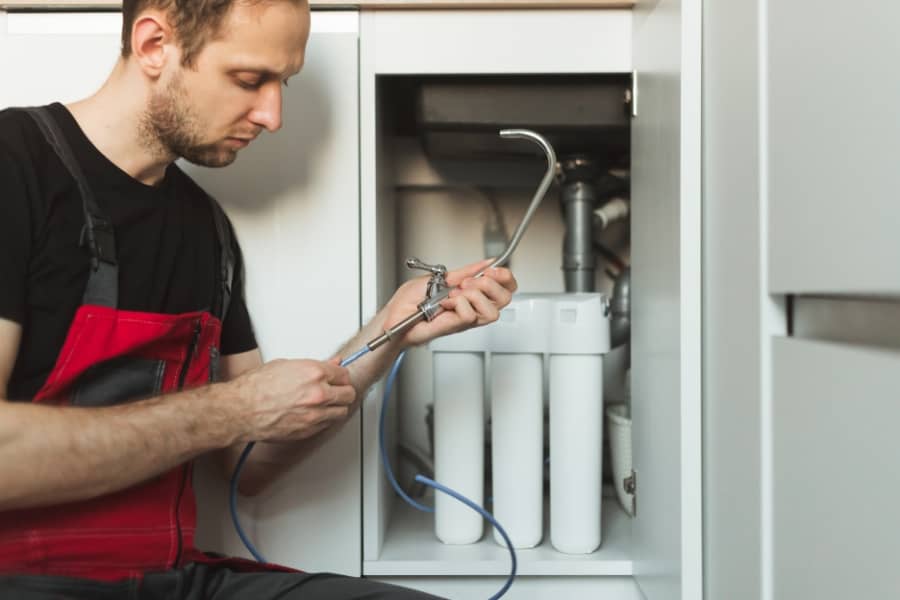
Water softeners and water descalers are two different ways to deal with hard tap water. If your home has hard water, either option can offer a good solution—but your best water treatment option depends on exactly how hard your water is and what investment you are looking to make in a system. Choosing water softener vs descaler is an important decision, so we’ve put together an explainer to help you make the best decision for your home.
What Are Water Softeners and Water Descalers Used For?
Water softeners and descalers are treatments for hard water. This kind of water contains dissolved minerals in quantities that make the water undesirable for specific purposes in the home, like:
- Lathering soap
- Keeping scale from building up on plumbing fixtures and appliances
- Keeping rust marks out of the toilet bowl and tank
What Is Hard Water?
Water from natural sources such as lakes and reservoirs doesn’t just contain water. It also contains dissolved substances, such as trace amounts of metals and minerals. The types of substances in the water depend on their source and origin.
Some water sources contain dissolved calcium and magnesium ions. These minerals are present in water that has percolated through natural formations of chalk, gypsum, or limestone. Water that contains these minerals is called hard water. In contrast, water that doesn’t contain these minerals is called soft water.
Why Is Hard Water a Problem?
Hard water isn’t toxic or hazardous, but it can still cause problems:
Lathering
Hard water contains dissolved calcium and magnesium ions that can damage pipes and appliances. It can also react chemically with soap, shampoos, and laundry and kitchen detergents and keep them from lathering.
Hard water can also make it harder to rinse soap and shampoos from your hair or to get clean in the shower. Some people have dry, itchy skin or damaged hair from showering with hard water.
Soap Scum
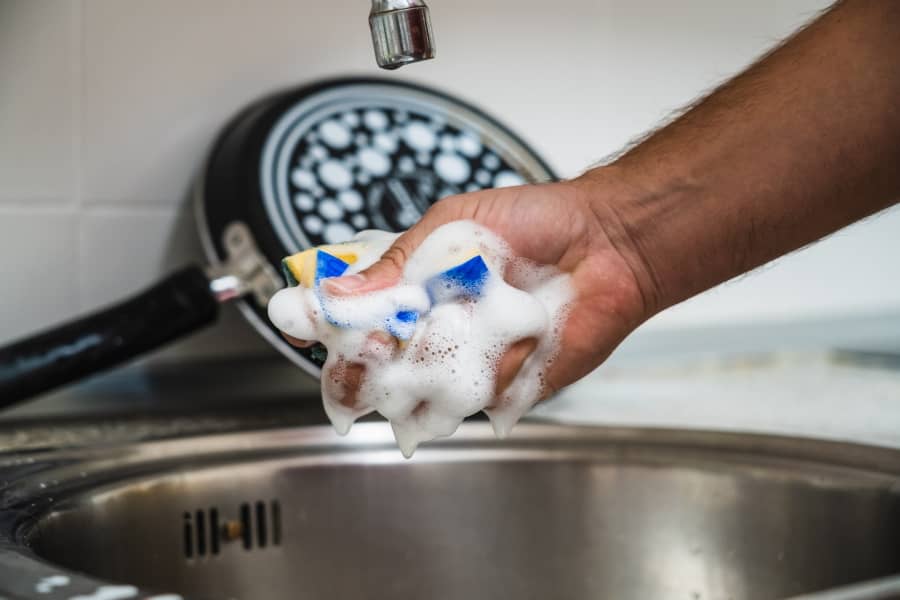
Soap scum is a mixture of dirt, soap, and minerals that forms when using soaps and detergents in hard water. It’s a chalky off-white or gray substance, most noticeable on surfaces after using the shower or bathtub. Soap scum doesn’t wipe off easily, and it can be very tough to remove if allowed to build up on surfaces.
Scale Deposits
Hard water leaves mineral deposits on pipes, fixtures, and appliances such as coffee makers, dishwashers, and washing machines. Over time this builds up as scaly deposits that are not only difficult to clean off but can reduce the efficiency of appliances like tank and tankless water heaters.
Scale is mostly harmless in small amounts, but as scale deposits get larger and thicker, they start to cause problems, such as:
- Blockages in pipes and plumbing fixtures, resulting in reduced water flow.
- Unpleasant-tasting coffee and streaky or spotty dishes, glasses, and flatware.
- Hot water systems are less energy-efficient, requiring replacement parts or an increased need for maintenance or repairs.
- Reduced lifespan of water-using appliances and hot water systems.
How to Solve Your Hard Water Problems
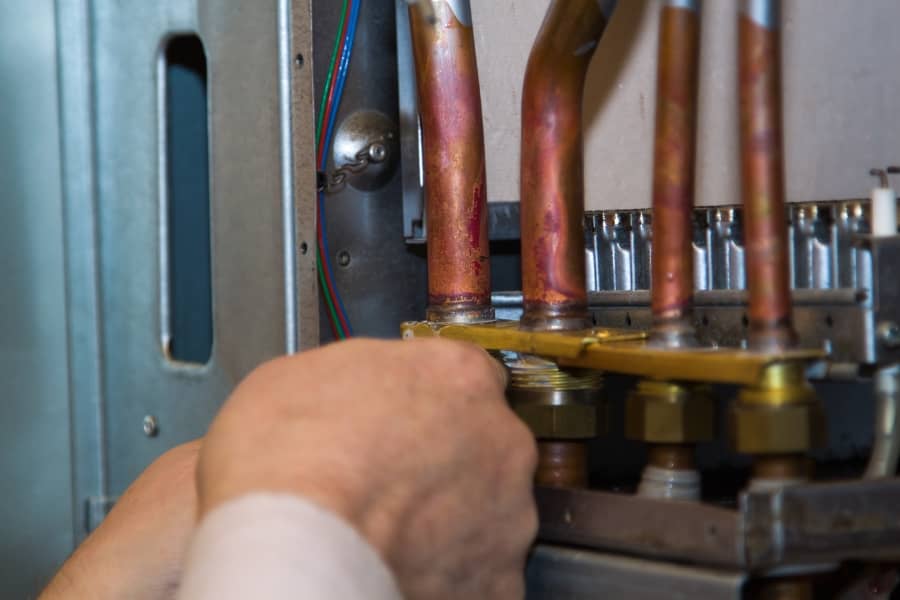
Installing a treatment system is an effective way to prevent hard water problems. You can choose among water softeners, descalers, and whole-house or point-of-use solutions.
Water Descalers
Water descalers don’t treat hard water by modifying the chemical properties of the calcium and magnesium ions. Instead, they change the polarity of the ions so they join together and go through the system without adhering to the pipes, fixtures, or appliances. Descalers prevent the damaging effects of hard water without the huge expense and maintenance of a water softener. However, they may not do as much to help with the other problems associated with hard water. Even with a water descaler installed, you may still have some problems with poor lathering and soap scum, depending on the extent of your hard water problem.
- Electric water descalers apply a low-voltage electric current to force minerals to stay dissolved instead of being deposited on surfaces.
- Template-assisted crystallization forces dissolved minerals to crystallize into a new formation that is chemically stable.
Water Softeners
Instead of modifying dissolved minerals, water softener systems remove them completely. This option is more effective at treating high levels of water hardness. If your home’s water has a moderate-to-high level of hardness, it’s usually best to opt for a water softener rather than a descaler. A water softener is a better option to address poor lathering and soap scum, as well as reduce scale buildup.
- Ion-exchange softeners are available as a whole-house system and for point-of-use solutions. These work by passing the water through a tank filled with resin beads that pull calcium and magnesium ions out of the water and replaces them with sodium ions.
- Reverse osmosis softeners work by forcing the water through a semi-permeable membrane that removes dissolved minerals, metals, and nitrates. Reverse osmosis water softeners can be used as whole-house treatment systems but are most commonly used for point-of-use solutions for single access points.
Water Softener vs Descaler: Which is Right for Your Home?
Should you go with a water softener or a water descaler? Do you need a point-of-use solution for a single water access point or a whole-house system that treats your home’s entire water supply? To choose the best home water treatment system, consider your exact water hardness level and your problems due to hard water.
For mild-to-moderate hard water
Both descalers and softeners can effectively prevent scale deposits from building up on pipes, fixtures, and appliances.
If your water is not severely hard, it’s easy to use cleaning products specifically designed to deal with soap scum. Soaps, shampoos, and detergents made for use with hard water address problems with lathering.
If you are looking to deal with scale buildup, you’re concerned about the price and installation of the system and ongoing maintenance, then a water descaler can be a good choice. But only a water softener can completely solve all the problems caused by hard water. A water softener is your best bet to address lathering and soap scum issues, but keep in mind that these systems often require maintenance, flushing, and possibly adding salt to the system. They are also more costly to purchase and install.
For moderate-to-severe hard water problems
You may be better off choosing a water softener if your water is very hard because a descaler may not treat the water as effectively as you would like. Water softeners provide a complete solution; they remove calcium and magnesium from the water entirely, rather than just changing the polarity of the water as it passes through the system. Water softeners do a better job of fixing poor lathering, soap scum, and scale deposits.
Do You Need a Whole-House or Point-of-Use Solution?

If hard water is causing problems throughout your home, then without question, a whole-house solution is the best option. Installing a whole-house system rather than separate point-of-use solutions at each access point is generally more cost-effective and practical.
You may not need a whole-house solution if your water is only slightly hard. In these cases, you can install a point-of-use water softener that treats the water at a single access point. For instance, if your sensitive skin is affected by slightly hard water, installing a special showerhead to soften water or filter water at that access point may be all you need.
Talk to CW Service Pros Today and Take Control of Your Home Water Quality!
Are you tired of dealing with poor lathering, soap scum, and the never-ending battle against scale deposits? You can take control of your hard water problems today. Call CW Service Pros, and we can help you choose a water treatment system that works for your home.







